A Path of No Return: Goran Rušinović’s “Buick Riviera” (Film Review)
Buick Riviera, directed by Goran Rušinovi?, 2008. Written by Goran Rušinovi? and Miljenko Jergovi?, 86 minutes, Propeler Film, Croatian Television, Tradewind Pictures (Germany), Refresh Production (BiH), Platform Pictures (USA), Film and Music Entertainment (UK).
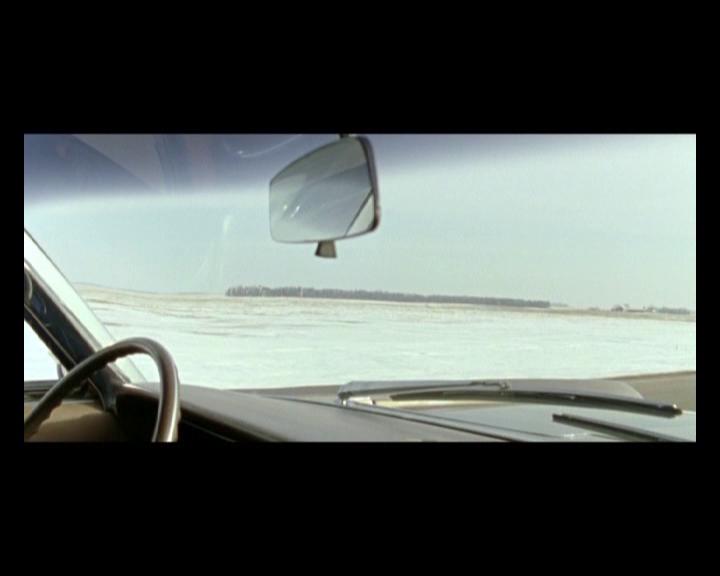 Goran Rušinovi?’s Buick Riviera is one of many films dealing with violence in the Slavic part ofthe Balkans during the last fifteen years. What sets it apart from the rest is the fact that it transposes the war both temporally (through the continuation of the war on a psychological level in the post-war period) and geographically (through re-location to another continent). Despite its specific Balkan references, this is a film that leaves the spectator pondering human nature in general and forces him to contend with the abyss between revenge and forgiveness.
Goran Rušinovi?’s Buick Riviera is one of many films dealing with violence in the Slavic part ofthe Balkans during the last fifteen years. What sets it apart from the rest is the fact that it transposes the war both temporally (through the continuation of the war on a psychological level in the post-war period) and geographically (through re-location to another continent). Despite its specific Balkan references, this is a film that leaves the spectator pondering human nature in general and forces him to contend with the abyss between revenge and forgiveness.
The question that permeates the entire film is whether one can escape one’s own self, and furthermore whether one can ever change or break away from the pre-determination of one’s origin. For a director of any age or experience these are charged issues, and it is thus particularly satisfying to see that this young Croatian filmmaker, whose previous films hardly went unnoticed (Mondo Bobo, 1997; Svjetsko ?udovište/The World’s Greatest Monster, 2003), has succeeded in embedding them in such a poignant story. Although the disintegration of Yugoslavia remains one of the film’s overarching concerns, it is as much about post-traumatic stress disorder and the possibility for overcoming cultural and personal obstacles in an attempt to find a new life in any context. With such complex topics there is always a risk of over-telling and over-directing; luckily, as the prizes the film has reaped at various festivals attest (Heart of Sarajevo in 2008; Golden Arena in Pula, Croatia, 2008; Critics’s Choice in Karlovy Vary, 2009), Rušinovi? did not fall victim to these temptations.
The film is based on Miljenko Jergovi?’s novel of the same title, which is itself a fine work deserving of its own analysis. Rušinovi? recognized, however, that being enslaved by a complex piece of literary writing would not serve him well if he was to deliver a more universal story, let alone one that relied on highly stylized filmic devices. While the novel employs a more traditional third person narrative with multiple digressions, the film for the most part revolves around the viewpoint of the principal character, Hasan Hujdur, a Bosnian refugee now living in the U.S. Rušinovi?’s artistic inclinations shine forth in the precision of his adaptation (Jergovi? was a co-writer), which focuses on the dilemmas of the principal characters, who, despite the specificity of their situation, encapsulate the experience of estrangement common to anyone who has found himself forced to live in a different culture.
Indeed, the basic story includes just three individuals (Hasan, his wife Angela, and Vuko, whom he meets on a highway by accident), whose lives become entwined in an unexpected way. A Buick Riviera, which comes to symbolize much more than an old gas-guzzling car, serves as a fourth protagonist. Already in the opening scene the world is observed from the interior of the car as its owner, Hasan Hujdur, digs it out of the snow. The location is the barren landscape of North Dakota, but it could essentially be anywhere. The music, suggestive of a hermetic and inward looking world, serves well the central question posed already in this opening scene: can one ever override what hurts inside and step out of internal pain to face a different world?
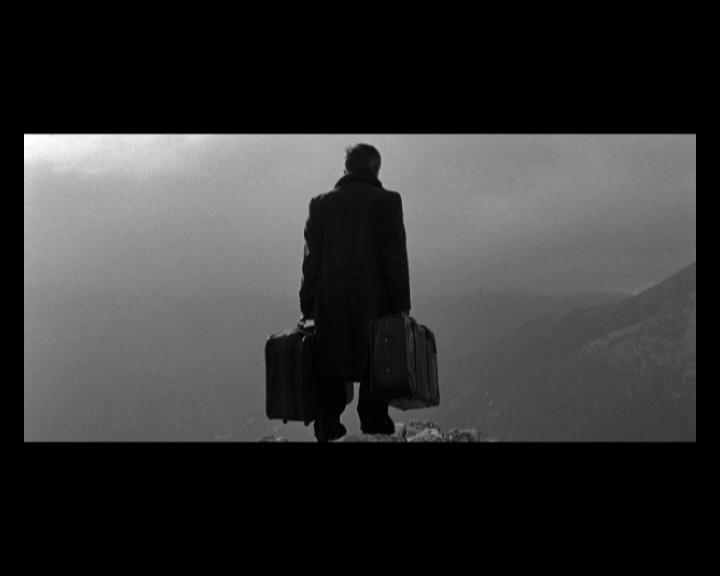 An unemployed refugee, Hasan escaped with deep scars from the wars of the 1990s, as reflected in a series of black-and-white flashbacks. The interior of the Buick Riviera is the only space where he feels at home. Much of the world is viewed from behind the wheel, with images of the chilling, white emptiness ofthe northern American plains alternating with the gray, anxiety-ridden vignettes of the war in Bosnia, themselves often seen through the front window of a car streaked with blood. What exactly happened in this earlier period of Hasan’s life in Bosnia remains unexplained, but one can deduct that his entire family was executed, his house destroyed, and that somehow he managed to escape.
An unemployed refugee, Hasan escaped with deep scars from the wars of the 1990s, as reflected in a series of black-and-white flashbacks. The interior of the Buick Riviera is the only space where he feels at home. Much of the world is viewed from behind the wheel, with images of the chilling, white emptiness ofthe northern American plains alternating with the gray, anxiety-ridden vignettes of the war in Bosnia, themselves often seen through the front window of a car streaked with blood. What exactly happened in this earlier period of Hasan’s life in Bosnia remains unexplained, but one can deduct that his entire family was executed, his house destroyed, and that somehow he managed to escape.
In the U.S. Hasan does not even attempt to find a job, but spends his days brooding and driving around, defending his old Buick from the criticisms of Angela, his practical German wife. The two have a very different notion of what the future might entail. For Angela, this means spending time and money on raising a family, not tending to a junky car, while for Hasan it is quite the opposite. His unsuccessful attempt to reconcile the Bosnia he wanted with the Bosnia today has been translated into his fight to save the old car as a way of preserving the past of which he was deprived. And though Hasan does not directly impose his burden on anyone, his wife nonetheless feels imposed upon through being prevented from realizing her own plans. While she wants to pursue the future, Hasan is trapped in the past. In his wallet he still carries the money of Yugoslavia before it fell apart, as well as his old documents. His head swirls with horrendous war-triggered images, which stand in stark opposition to the idealized stories he tells Angela of his country, where complete strangers were cordially invited to the family table for a meal or coffee.
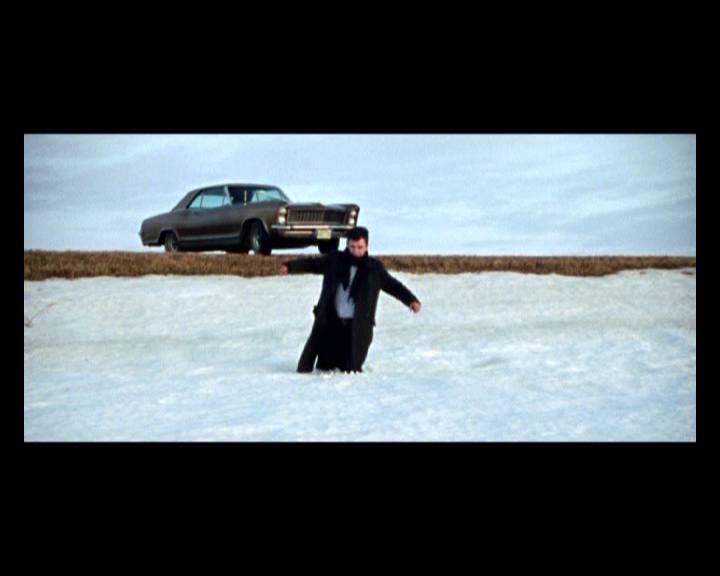 After the usual sparring with his wife, and in order to ameliorate the tense situation, he offers to pick her up from the night shift in the police station where she works as an officer. Tired and haunted, he gets distracted and skids off the icy road. Nothing happens to him but the Buick is stranded and Hasan waits for the rare passing car to give him a ride on the empty road. By chance, the first one to stop introduces into his life a man from his own country, named Vuko Šalipur. The two speak the same language, but from their names it is immediately apparent that one is a Bosnian Muslim, the other a Bosnian Serb (Orthodox Christian). Initially they are not troubled by this and there is an unmistakable willingness to help. While the Serb could have offered to give Hasan a ride to the nearest town, he goes out of his way first to see whether they can somehow tow the car and then drives Hasan all the way to the police station where his wife is angrily waiting.
After the usual sparring with his wife, and in order to ameliorate the tense situation, he offers to pick her up from the night shift in the police station where she works as an officer. Tired and haunted, he gets distracted and skids off the icy road. Nothing happens to him but the Buick is stranded and Hasan waits for the rare passing car to give him a ride on the empty road. By chance, the first one to stop introduces into his life a man from his own country, named Vuko Šalipur. The two speak the same language, but from their names it is immediately apparent that one is a Bosnian Muslim, the other a Bosnian Serb (Orthodox Christian). Initially they are not troubled by this and there is an unmistakable willingness to help. While the Serb could have offered to give Hasan a ride to the nearest town, he goes out of his way first to see whether they can somehow tow the car and then drives Hasan all the way to the police station where his wife is angrily waiting.
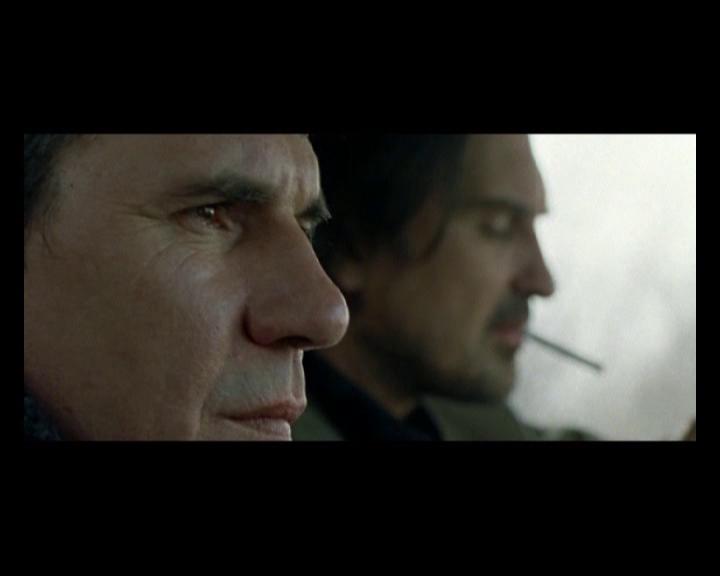 During the ride Hasan says that he hasn’t been back since the war started so he would not pick up on the hatred that has engulfed the region. This claim contradicts what the spectator has already learned of Hasan’s experience of the war. Clearly, he is not willing to share his pain, in particular not with a Serb. Vuko himself has not been spared marital problems, and despite the comfortable life he had with his wife, he has become increasingly frustrated. That very morning, in fact, he had gotten into his car and driven away from his life with no desire ever to return. An ability to walk away from the past, regardless of what the past contains (a differentiation elegantly hinted at in the film, and overly elaborated in the novel), is a quality which allows for fine tuning in the principal characters’ psychologies.
During the ride Hasan says that he hasn’t been back since the war started so he would not pick up on the hatred that has engulfed the region. This claim contradicts what the spectator has already learned of Hasan’s experience of the war. Clearly, he is not willing to share his pain, in particular not with a Serb. Vuko himself has not been spared marital problems, and despite the comfortable life he had with his wife, he has become increasingly frustrated. That very morning, in fact, he had gotten into his car and driven away from his life with no desire ever to return. An ability to walk away from the past, regardless of what the past contains (a differentiation elegantly hinted at in the film, and overly elaborated in the novel), is a quality which allows for fine tuning in the principal characters’ psychologies.
While Vuko has accepted the new ways (including a U.S. passport and a new land rover), Hasan is still holding onto both old ways and old things. Hasan’s refusal to share personal information and to be in misery together is quickly projected by Vuko into a charged political context, and he becomes obsessively determined to shake Hasan out of his semblance of a cozy life. Irritated, Hasan offers a few words about his matrimonial headaches. Despite his verbal parsimony, he reveals perhaps more than he intends when he says: “the Buick is my America. I have gone through all kinds of things in him and always felt at home.”
On the way back Vuko cannot resist a temptation to check out the old Buick. Like a child with someone else’s toy, he hops in, feels the wheel, turns on the wipers, smokes a cigarette and unexpectedly finds the other man’s wallet in the snow. Having disposed of his own car in a grocery store parking lot, he materializes in front of Hasan’s door with a suitcase. It is difficult to pinpoint the moment at which Vuko decided to acquire the Buick, but it is made abundantly clear that his primary motive is not to hide his tracks (after all he ran out of the house that morning in a vehicle belonging not to him but his wife and, as we later learn, with a large sum of cash), but more likely to take revenge for Hasan’s initial rejection of friendship.
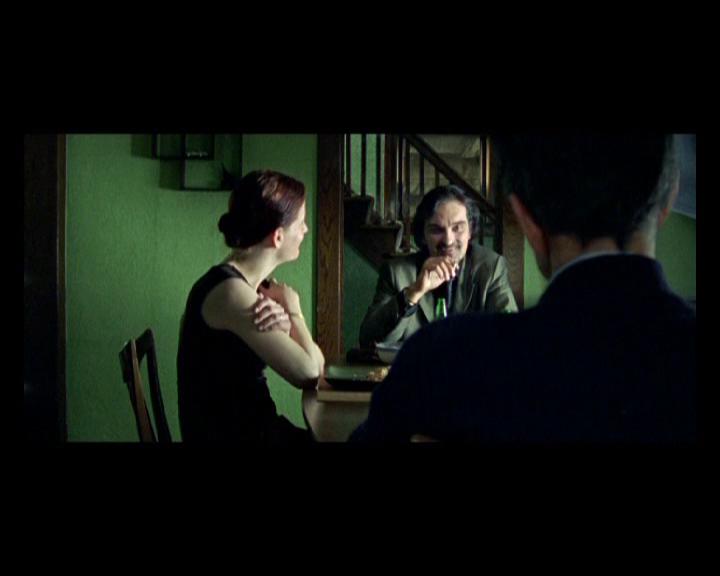 Hasan thanks Vuko for returning the wallet, but shows no intention of inviting him in. Angela, however, reprimands Hasan for such behavior, especially given what he has told her so many times about Bosnians’ welcoming nature. Hasan is thus manipulated into a dinner during which he murkily and angrily follows a flirty conversation between Angela and Vuko. Although in his previous life in Bosnia Vuko was just a bus driver, Angela is amused by his stories and finds his outlook on life (“letting go”) healthy. The tone of communication changes entirely in a few brief exchanges when Vuko and Hasan switch to their mother tongue. In those moments they resemble two bloodthirsty wolves measuring one another before an attack. Vuko is the first to jump when he offers a large amount of money for the worthless car. Thinking that Vuko is playing games, Hasan refuses the deal and furiously rejecting the idea that anything of his might become Vuko’s. Angela’s intervention only exacerbates the situation further since she is unaware of the fact that she is perceived as yet another possession and has been manipulated as such throughout the dinner.
Hasan thanks Vuko for returning the wallet, but shows no intention of inviting him in. Angela, however, reprimands Hasan for such behavior, especially given what he has told her so many times about Bosnians’ welcoming nature. Hasan is thus manipulated into a dinner during which he murkily and angrily follows a flirty conversation between Angela and Vuko. Although in his previous life in Bosnia Vuko was just a bus driver, Angela is amused by his stories and finds his outlook on life (“letting go”) healthy. The tone of communication changes entirely in a few brief exchanges when Vuko and Hasan switch to their mother tongue. In those moments they resemble two bloodthirsty wolves measuring one another before an attack. Vuko is the first to jump when he offers a large amount of money for the worthless car. Thinking that Vuko is playing games, Hasan refuses the deal and furiously rejecting the idea that anything of his might become Vuko’s. Angela’s intervention only exacerbates the situation further since she is unaware of the fact that she is perceived as yet another possession and has been manipulated as such throughout the dinner.
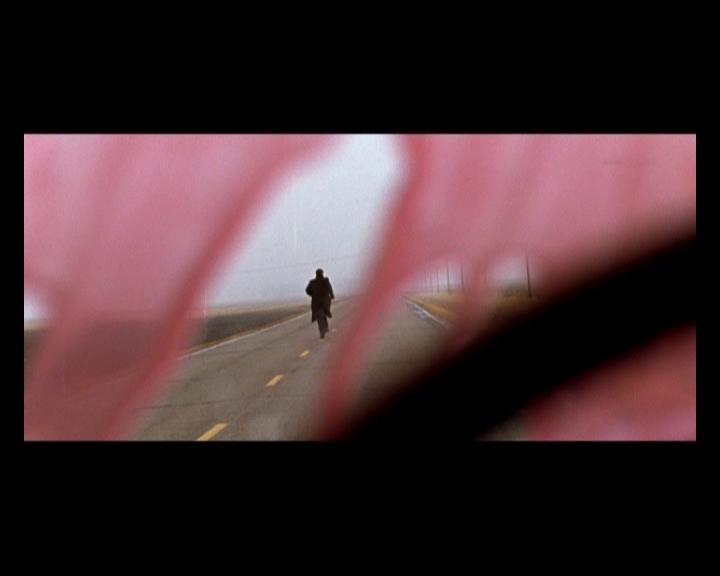 A full consensus is never reached. In fact, the dinner ends with an ostentatious capitulation leading to the final scene of the film, in which a bloody streak flows down a car’s front window, thereby repeating history and replaying its shrill images once more. The film seems to ask: Do Balkan-like feuds live in all of us; is it possible that in the land of abundance and prosperity the old ghosts – whatever they may be — come and haunt us, regardless of where we find ourselves? Earlier in the film the suggestion that any place can be as good or bad as any other is made rather directly when a radio announcer asks listeners about a place they visited that turned out to be unexpectedly welcoming.
A full consensus is never reached. In fact, the dinner ends with an ostentatious capitulation leading to the final scene of the film, in which a bloody streak flows down a car’s front window, thereby repeating history and replaying its shrill images once more. The film seems to ask: Do Balkan-like feuds live in all of us; is it possible that in the land of abundance and prosperity the old ghosts – whatever they may be — come and haunt us, regardless of where we find ourselves? Earlier in the film the suggestion that any place can be as good or bad as any other is made rather directly when a radio announcer asks listeners about a place they visited that turned out to be unexpectedly welcoming.
In the novel from which the film is adapted the political element is set forth much more directly. Jergovi? depicts post-9/11 America as suffering from xenophobia, thus allowing Vuko to capitalize on anti-Muslim sentiment. Hasan abruptly abandons home, leaving a note telling Angela not to look for him since he is heading for Kandahar, which sounded far enough away. This information is sufficient for the intelligence services to pronounce Hasan a terrorist after his unexpected disappearance. Jergovi?’s attempt to correlate the extremism that led to the tragic loss of life in the Balkans with that which caused the horrible events of 9/11 is shrewdly avoided in Rušinovi?’s film. By focusing on the psychology of the three principal characters and leaving politics on the margins, Rušinovi? manages to provide just enough in the way of detail to establish the terms of the conflict, while leaving the reference points sufficiently ambiguous to allow for the substitution of any other ethnic/religious category. He also digs deep enough into the hearts and minds of the protagonists that a story of displacement, a yearning for the old, and a failure to adjust becomes more universal and much more compelling than would have been the case had he placed it in the context of current American political discourse.
There are many other elements that Rušinovi? has opted to leave out of the script, such as Hasan’s frequent visits to a local pub owned by a Spanish painter who long ago abandoned painting for solitude and alcohol, as well as the protagonists’ ties with the artistic world (in the novel Hasan is a documentary filmmaker and Angela a theater actress), which thereby makes their lives much more ordinary. Their circle of friends is also done away with, and family background, except for Hasan’s flashbacks and Vuko’s rambling about his marriage, is completely omitted, as is Vuko’s war experience as a murderer hiding his tracks in the U.S. As a result of these and other omissions the movie is tenser, more focused and charged than the novel.
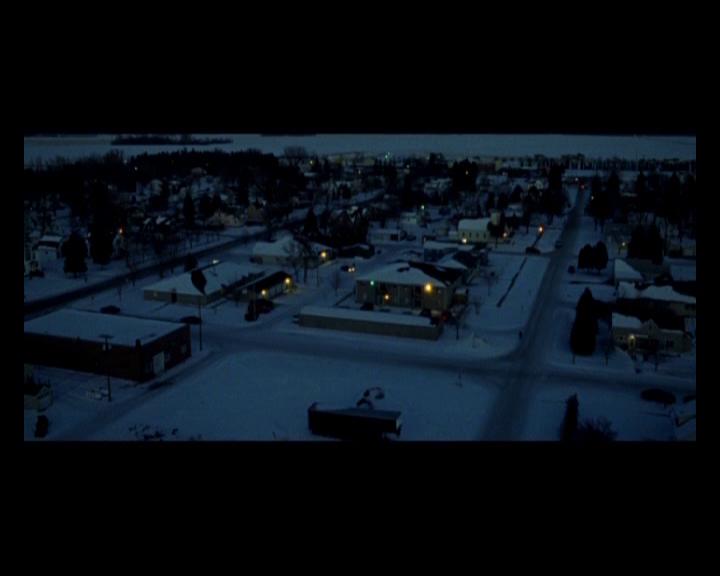 Rušinovi?’s film, with its stark depictions of gloomy American towns in the middle of nowhere, has Herzogian overtones. He should be commended for fine camerawork, which while minimalist in nature, beautifully portrays a sense of isolation, displacement, disengagement and purposelessness. His color scheme is deliberately reduced to monochromatic tones even in the color sequences, which are dominated by the whiteness of the snow-covered landscapes. The symbolism of color comes forth strongly in the last scene, where the central color in the flashback is red, thereby merging the image of a murder from the past with a murder in the present. The two male actors, Slavko Štimac and Leon Lu?ev, both deliver extraordinary performances for which they shared the best actor award at the Sarajevo film festival. Buick Riviera has its roots in the road movie, a genre that has morphed from American screens into a specific subcategory of Balkan war films, including other recent titles. More than any other film from this group, however, Rušinovi?’s locates conflict within the psychology of his characters, and this allows him to depict the war that is always and everywhere.
Rušinovi?’s film, with its stark depictions of gloomy American towns in the middle of nowhere, has Herzogian overtones. He should be commended for fine camerawork, which while minimalist in nature, beautifully portrays a sense of isolation, displacement, disengagement and purposelessness. His color scheme is deliberately reduced to monochromatic tones even in the color sequences, which are dominated by the whiteness of the snow-covered landscapes. The symbolism of color comes forth strongly in the last scene, where the central color in the flashback is red, thereby merging the image of a murder from the past with a murder in the present. The two male actors, Slavko Štimac and Leon Lu?ev, both deliver extraordinary performances for which they shared the best actor award at the Sarajevo film festival. Buick Riviera has its roots in the road movie, a genre that has morphed from American screens into a specific subcategory of Balkan war films, including other recent titles. More than any other film from this group, however, Rušinovi?’s locates conflict within the psychology of his characters, and this allows him to depict the war that is always and everywhere.





